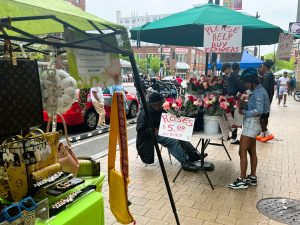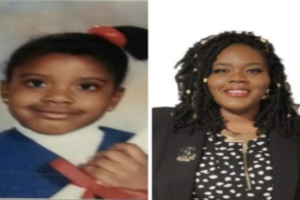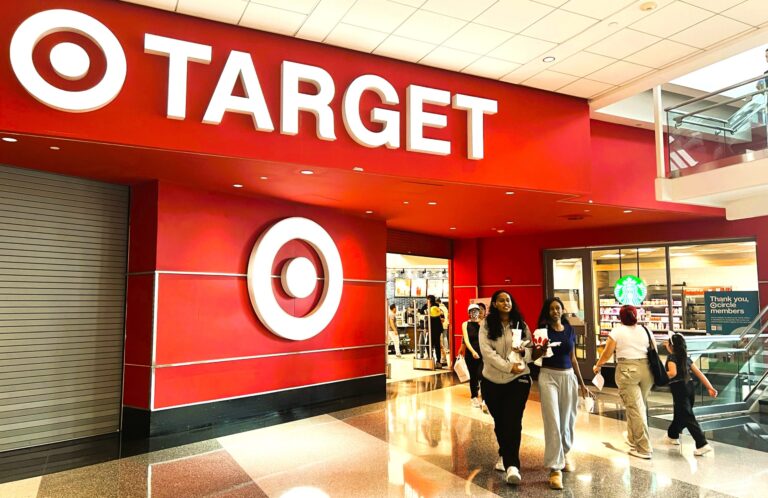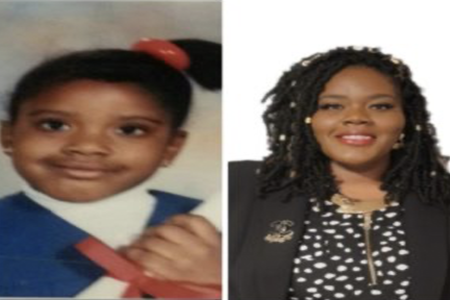By Dr. Patrise Holden, Washington Informer
Special to Black Press USA

Black and Hispanic street vendors, positioned along the street in front of Target, expressed worry that decreased foot traffic from sustained boycotting will affect their ability to make a living, and possibly put them out of business. (Photo/Dr. Patrise Holden)
Signs in hand, on April 19th, a small crowd of about 10 people gathered in front of the Target at 14th and Columbia Road NW, Washington, DC. Voices raised, as part of a three-day economic blackout from April 18 to April 20, the crowd marched while urging Black and Hispanic shoppers to refrain from purchasing from Target, which has been criticized for its stance on diversity, equity, and inclusion (DEI). Ongoing national boycotts launched as a protest against Target’s cessation of diversity, equity, and inclusion (DEI) initiatives, have ignited a powerful economic and cultural conversation and corresponding action from Black communities across the nation. Backed by spiritual and community leaders, including Pastor Jamal Bryant, who initiated a 40-day fast from shopping at Target, the movement has drawn national attention. The goal is to harness the power of Black dollars to demand respect, representation, and equity.
Boycotts Heighten Economic Stress for Many African Americans
While many celebrate the boycott as a bold stand for economic justice, its ripple effects have been complicated, especially for many within the very community that it is meant to empower. Emmy award-winning host, actress, and multi-NAACP Image Award winner Tabitha Brown, who has partnered with Target on several successful product lines, expressed concern in a January 2025 livestream over the long-term effects of the Target boycott on Black-owned businesses. “As disheartening as it is for me, I am not the only one affected by this. It is for so many of us who worked so very hard to finally be seen. Contrary to what the world might tell you, it has been very hard for Black-owned businesses to hit shelves,” said Brown.
Under immense pressure from boycott participants to pull their products from Target and Walmart shelves, Brown sought to educate the public gently regarding the finances and logistics required to pull products from national stores. “You have to have a place to store it, another place to sell it, which is almost impossible sometimes. Even if you sell online, it’s a process, and everyone does not have the availability or the space to house their own products.” Employees within the company are also feeling the strain. A middle-aged African American female Target worker at the 14th and Columbia location, under anonymity, said, “Although this location has not seen reduced traffic due to the boycotts, I have colleagues in other Targets that have had their hours cut due to low sales. Some Targets have had to lay off workers, and yes, a high number of these workers are Black. Black mothers and Black families are trying to work hard to feed their kids. We can’t say we are uplifting the Black dollar and impoverishing working-class people at the same time.”
The sentiments of this Target employee highlight a key issue: while boycotts send a clear message to corporations, they can also inadvertently harm small Black businesses and working-class consumers. African Americans shopping during the active Target boycott expressed frustration, indicating that they cannot afford to buy from multiple independent Black-owned vendors online, each with separate shipping costs and separate delivery dates and times. A young African American couple, six-month-old baby in hand, related, “In theory, I support the boycotts. I’d love to do it because control of Black dollars uplifts our people. But I have two children and limited transportation,” said the mother. “I honestly don’t have the money to pay online separate shipping fees and lose the savings of Target sales and specials, which would not be available by buying from each individual website.”
Boycotts: Celebrated Yet Questioned by Small Vendors and Many Consumers
The Target boycott has been undeniably successful in raising awareness and showing the collective power of the Black dollar. However, many African Americans say that it is essential to strategize more to ensure that economic protests do not unintentionally weaken the very ecosystem that it seek to empower. “For us to move forward, the movement doesn’t start with Target. When we focus within, lasting change from without always follows. I am for the boycotts, however, when we focus on us as a collective internally, I think the path to widespread, sustainable change becomes more attainable. Through it all, faith in God and working on changing the men and women in the mirror is how we continue to advance as a people,” said Richard B. Lewis, 37, upon exiting Target. Uniquely located, one block from the Metro, inside a multi-story mall containing a grocery store, a large electronics chain store, two major clothing retailers, and a shoe store, the Target at 14th and Columbia experiences high amounts of diverse shoppers and foot traffic.
Street vendors, exclusively Black and Hispanic, have fought city regulations for years for the right to sell products and retail along the street in front of the corporate giant. Many vendors expressed worry that decreased foot traffic from sustained boycotting would affect their ability to make a living and possibly put them out of business. Miss Carol of My Virtue, a handbag and accessory vendor, said, “As entrepreneurs, many of us Black vendors depend on foot traffic and sales from customers shopping at Target. People who don’t even plan to shop with us become return clients because of the convenience of having so many diverse vendors right here outside the store. Revenue loss from decreased Target sales could mean financial ruin for many vendors out here.”
Understanding the devastating loss of revenue to vendors, small and large, Brown continued in her January livestream, “Businesses who were affected by DEI, you take all our sales and they dwindle down, and then those companies get to say, ‘oh your products are not performing,’ and they can remove them from the shelves.” When sales dip, companies re-evaluate shelf space. If Black-owned brands underperform, they can be quietly pulled from stores. In six months to a year, we could see a whitewashed version of Target and Walmart, places where Black retailers fought for decades to get representation, disappear overnight. Brown emphasized, “Sometimes, that is what they want, and in times like this, they are telling us that.”







